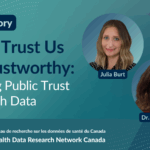From trust us to trustworthy: Building public trust in health data


Timely access to reliable health data by health care providers, systems and patients is critical to providing high-quality health care. For this to occur, the public must trust governments and institutions to collect, protect, share and use health data. But how is this fragile trust earned, and what is required to keep it?
These and other questions around public trust in health data are the focus of a new paper published by HDRN Canada. “Trust is complex,” said Dr. Kim McGrail, HDRN Canada CEO and Scientific Director and a co-author of the paper. “It isn’t static. It requires ongoing effort, and it shifts, strengthens or erodes depending on the type of data and the user.”
For public trust to blossom and remain ongoing, we need a movement toward greater health data literacy, transparency and person-centred health data design ~ Julia Burt
Public Trust, Literacy and Health Data Foundations in Canada: A Foundational Paper defines health data as information that describes a person’s health, their health care or anything about their health status or condition. Funded by the Public Health Agency of Canada, the paper draws upon focus groups and key informant interviews as well as literature reviews to explore the connection between trust and health data literacy.
“The evidence suggests that health data literacy is essential for helping people make informed decisions about their health, health care and health data,” explained co-author Julia Burt, Public Engagement Operations Lead for HDRN Canada. “Greater health data literacy may not inherently increase trust, but it is certainly a foundational element for creating the possibility for trust, alongside other key factors such as transparency and public benefit.”
Trust has to be earned, Burt continued. “The way institutions and organizations that handle health data earn the public’s trust is by being trustworthy.” She described trustworthiness as a set of actions, such as those related to accountability and governance mechanisms, that are the basis on which trust is given, withheld or withdrawn.
The paper identifies the risks and benefits of data sharing as well as protections to maximize benefits and minimize risks. “There are many benefits when we enable the smooth flow of health data, such as improving patient care and advancing research,” Dr. McGrail said. “But there are also important concerns about privacy, security and potential misuse.” Risks from health data sharing and use also differ depending on whose data are being shared, she continued, noting that health data have been—and continue to be—used to stigmatize and harm people from underserved or marginalized communities.
Public trust in health care data is vulnerable in the wake of misuse, such as a data leak, which can have serious, long-term repercussions. Low public trust can lead to skepticism and potentially discourage Canadians from seeking timely care, weaken public health responses, harm underrepresented groups and strain the health system. The consequences of low public trust range from amplifying systemic inequalities and wasting resources to rising costs and, in the most extreme cases, death.
Conversely, according to Dr. McGrail, high degrees of trust in health data have been shown to enhance patient care, decrease medical errors, promote faster clinical research innovations, and enable more rapid, effective responses to public health emergencies like the COVID-19 pandemic. “That is why the stakes are so high for getting this right.” Trustworthy practices don’t just protect individuals, Burt added. “They strengthen the system as a whole and offer an immense amount of broader public benefit.”
“We wrote this paper to help different levels of government and health system organizations work together to earn public trust in health data,” Dr. McGrail said. “We offer a pathway to trustworthy practice for governments, organizations and institutions that collect, use and share health data through six principles-based recommendations.” Grounded in the Pan-Canadian Health Data Charter, these recommendations call for a commitment to inclusive public engagement, reconciliation with Indigenous communities, clear standards for data use, secure technologies that protect information, alignment with the broader public benefit and a culture of transparency that supports reciprocal learning. “Lasting trust is less about words and more about consistent practice that builds confidence over time,” said Dr. McGrail.
“For public trust to blossom and remain ongoing, we need a movement toward greater health data literacy, transparency and person-centred health data design,” Burt emphasized. “This must be an ongoing conversation that includes governments, nonprofits, healthcare providers and the public.”
Watch and share Public Trust, Literacy & Health Data Foundations in Canada with Dr. Kim McGrail and Julia Burt, to learn more.
